Much better looking, high-resolution versions of the No Country for Old Men trailer are now up on Rotten Tomatoes. My comment two days ago about the Miramax marketing guys having “made this marvelous film look like an action-horror flick about a stalking ogre” was, I think, fair. I only meant that the film is obviously upmarket — brilliant, nerve-wracking, melancholy, funny-creepy, meditative and engineered like a Swiss watch. And that the trailer (and I’m not saying this is unwise from a marketing standpoint) is pretty much aimed at the gorillas.
New Baddies of 2007
Six years and three months ago — on 3.21.01 — I considered a spate of dreadful early 21st Century youth-market pics like American Pie (has anyone re-watched this thing lately?), Saving Silverman, Head Over Heels, Say It Isn’t So, Tomcats, Josie and the Pussycats and American Pie 2. I then considered the young actors who’d starred in these films, and decided that they’d basically become (or were fated to be) shit magnets. As it turned out, I was mostly (or at least half) right.
My personal must-to-avoids in that pre-9.11 time pocket were Jason Biggs, Freddie Prinze Jr., Chris Klein, Amy Smart, Seann William Scott, Monica Potter, Tom Green, Mena Suvari, Jack Black and Amanda Peet.
Which of these actors has a reasonably vibrant, still-happening career today? One — Jack Black. The others are either marginal, sputtering or fizzled. Why? I think it’s at least partly because these actors made so many shallow/dreary/shitty movies, and people just got tired of submitting. Another reason is that anyone enjoying any kind of career flare-up these days is doomed to succumb to the 15-minute cycle because of the increasing velocity and volume of everything.
Question: which young actors today are cruising for a similar bruising? You see their names on the poster, and right away a voice tells you (however fairly or unfairly, accurately or inaccurately) it’s either so-so or mediocre or an outright stinker. Because of one factor and one factor alone — they’re in it.
“Four Months” yanked
Christian Mungiu‘s Four Months, Three Weeks and Two Days, which won the Palme d’Or prize at the Cannes Film Festival, may be the most ecstatically received Roumanian film in history. I missed it at Cannes myself, so naturally I was looking forward to seeing it at the upcoming Los Angeles Film Festival, where it had been booked by its Parisian producer-financier, The Wild Bunch.
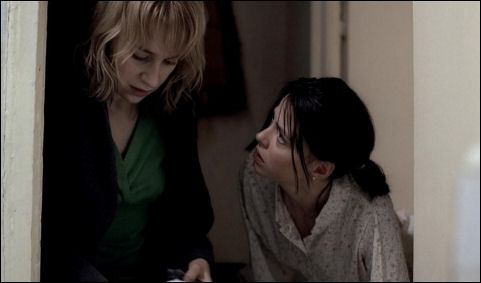
But IFC, which acquired Four Months in Cannes with plans to open it sometime in the fall, has pulled it from the L.AFF, despite a prominent listing in the printed program. A source tells me “the film was committed to the L.A. Film Festival by Wild Bunch before it was sold….we wanted it to be a premiere….we’d just bought the movie, and there were no materials and nothing was ready….we don’t even have a print, and we weren’t ready to start working on it…we don’t even know when we’re going to open it….a lot of decisions have yet to be made..”
Havens on “Jesse James”
In relatively honest fashion, Film Jerk‘s Edward Havens attended a research screening of an allegedly “truncated” version of Andrew Dominik‘s The Assassination of Jesse James by the Coward Robert Ford (Warner Bros., 9.21.07), although it’s hard to think of any 140-minute film as truncated.
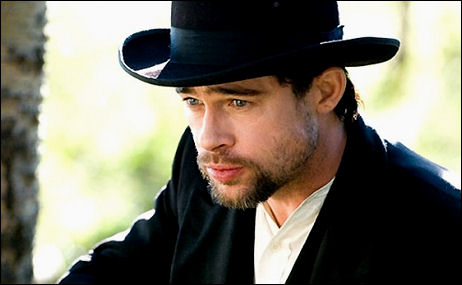
I have to confess to profound disappointment in reading that Jesse James, like Blade Runner, uses narration and, in Havens’ view, will be “a tough nut to crack if you’re not paying total attention, words I am certain the studio would never want to hear, even though they had to know exactly what they were getting into when they greenlit this film.” I hate, hate, hate narration. The only time I’ve really loved it was in Terrence Malick‘s Badlands and Days of Heaven and maybe four or five others.
Nonetheless, Havens is a rapt admirer. He says it’s all but guaranteed a place on his list of ’07s Best Films of the Year upon its opening in late September. He says that Brad Pitt, as Jesse James, turns in the best performance of his career since 12 Monkeys, and yet ” this is not his film. It is Casey Affleck, as Robert Ford, who owns the screen by the time the film is over.”
The Assassination of Jesse James by the Coward Robert Ford “doesn’t try to reinvent the western as much as bring back to the same kind of timelessness which have made The Searchers or “The Wild Bunch or the westerns of Clint Eastwood favorites for generations. Twenty years on, Young Guns feels like even more like the tired ’80s movie we knew it was when it was first released. Twenty years from now, this film will not be a victim of its time. It will be still be watched and benefit from the attempt to not chase what is hip or hot today.
“No matter what shape the final film takes, I suspect it will emerge as the best film the genre has seen since the days of Sergio Leone and Sam Peckinpah. Yes, The Assassination of Jesse James by the Coward Robert Ford is better than Unforgiven. Better than Dances with Wolves. Better than Silverado or Wyatt Earp or any other Western in the past thirty years. I cannot wait to see it again.”
“Silver Surfer” review
“To some extent, the noncommital perfs, lazy dialogue and retro-cheesy visual effects could be chalked up to the pic’s refusal to take itself too seriously; one would be hard-pressed to recall the last time the apocalypse was treated this breezily onscreen. But at a certain point, even the most popcorn-hungry moviegoers may find themselves craving something in the way of real dramatic stakes. To defend Fantastic Four: Rise of the Silver Surfer on the grounds that it’s unpretentious is to make too generous an excuse.” — from Justin Chang‘s 6.14 Variety review.

Jolie’s anti-press maneuvers
Angelina Jolie didn’t want the wolf-vulture element trying to wheedle personal stuff out of her during the Mighty Heart junket, and she seems to be down on Fox News because…I don’t know why. Because of their political associations? So yeah, she’s trying to control things, and that obviously makes her a non-advocate of freedom of the press. But I don’t blame her that much for playing her cards this way.
Racial discrimination lawsuit
Universal Pictures has settled with Frank Davis, the African-American first assistant director who’d filed a racial discrimination lawsuit over his getting fired off 2 Fast 2 Furious. It’s rough getting canned — it can really hurt — but when I read the comments of Universal production executive Andrew Fenady, as passed along by L.A. Times reporter Lorenza Munoz, I couldn’t help but go “hmmm.”
Fenady testified that doubts about Davis’s work performance “arose before he was aware [he] was African American. Fenady said his concern mounted when he attended a meeting in August 2002, after Davis was hired, during which the first assistant director seemed to lack ‘command’ of how complex scenes would be coordinated.
“By September, when filming began in Miami, production staff told Fenady that Davis was ‘a weak link,’ and that the production was going to suffer, Fenady said. In a movie, the first assistant is a key liaison among the director, the crew and the production staff.
“Fenady said that on the third day of principal photography the set was in ‘sheer and total chaos.’
“But the clincher for him came when the studio’s transportation captain said to him that Davis was ‘going to get someone killed out here,’ Fenady testified.
“Fenady said he flew back to Los Angeles and immediately reported this to his boss. Davis was fired a few days later.”
Inescapable gunfire
“As the light fades and the first stars come out, the movie begins. It is thrilling, larger than life, romantic — heightened by the night air, by the vastness of the screen. For the first time, I understand the concepts of sexiness and attraction — Faye Dunaway and Warren Beatty emanate both.
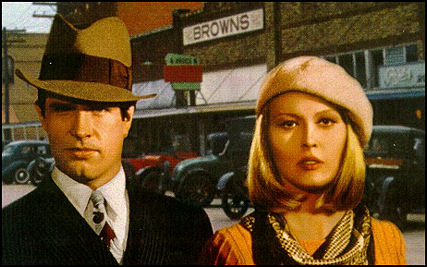
“In the beginning, there is something fun about the movie — madcap, Keystone Cops, outlaw heroes, the chase. I sit in the back seat with my brother eating penny candy: Pixie Stix, Atomic Fire Balls, root-beer barrels, Lik-m-aid. And then I am afraid, overwhelmed.
“During the parts of the film that I don’t like, I duck down in the seat; the sound of gunfire — blasting from the metal box just in front of my left ear, tinny, too loud — is inescapable.” — from a 6.11.07 New Yorker “Summer Movies” piece by A.M. Homes.
Foundas considers the Landmark
In an L.A. Weekly piece about the just-opened Landmark plex in West L.A., which is committed to showing mostly indie-level fare, critic Scott Foundas talks to San Francisco exhibitor and Telluride Film Festival co-director Gary Meyer about the future of upscale exhibition.
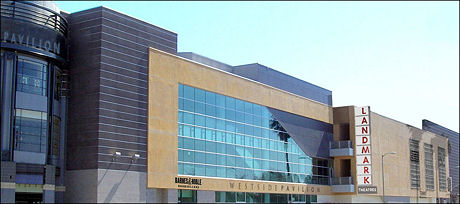
“It’s my feeling that within the next 10 years, the screen count in the U.S. will go from the current 37,000 to under 10,000 screens,” Meyer predicts. “Films will come out theatrically, on DVD and through on-demand cable simultaneously. There will be the occasional event film that may only be available in theaters, but for everyone else, the economics are going to dictate that things move in this direction.
“There will be centralized megaplexes; you won’t have one in your neighborhood anymore. It will be like back in the old days — you’ll be driving to the `event’ theater. Most of the small neighborhood art houses will go away, and you’ll have art complexes like the Landmark that will survive because they’ll be the only ones showing those films.”
Foundas also speaks to theatrical booker Dick Morris, who sounds a more pessimistic note. “You can’t play 12 screens of art — it’s out of the question,” he proclaims. “Most of the audience for these films is now at Forest Lawn or some other cemetery. For the under-50 crowd, it’s just not the thing to do.”
Wells note: what is Morris saying here? That art film lovers might want to think about throwing in the towel and putting a plastic bag over their heads because the game is basically over? What a fucking cynic!
And yet Landmark COO Ted Mundorff feels that the Landmark is the very theater that could bring a new generation of moviegoers to art films. “People go to a megaplex theater without necessarily having a particular film in mind,” he says. “As we play a wide array of product in the theater, I think it will introduce the theater and introduce the concept and make people want to explore films.
“If they really like going to the theater, they may take a chance on a movie they wouldn’t ordinarily go to see. There becomes a trust factor; I think people will trust what we play.
“Cheese” finally opening
16 or 17 months after the 2006 Tribeca Film festival debut of Jeff Garlin‘s I Want Someone to Eat Cheese With, a smart and emotionally poignant character comedy in the general vein of Paddy Chayefsky‘s Marty, it’s finally going to be put in front of paying audiences. Three and a half months from now, that is.
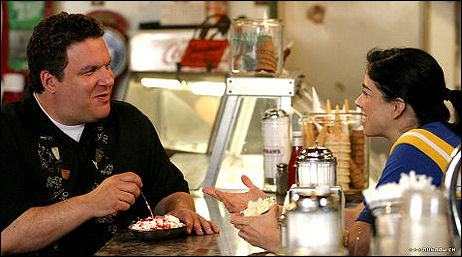
Jef Garlin, Sarah Silverman in I Want Someone to Eat Cheese With
IFC First Take and The Weinstein Company will be booking Cheese into theatres in “late September,” according to a just-received press invite to some early-bird screenings. My gut tells me that Harvey and IFC are sorta kinda looking to dump it in a super-supportive “we love you Jeff and we love your movie” type of way, but it deserves better than that.
I saw Cheese almost a year ago at the L.A. Film Festival, and thereafter described it as “a Big Fat Greek Wedding for witty fat guys, only without the wedding or the slobbery cattle-yard relatives.”
I also called it “the most entertaining and engaging audience-friendly film I’ve seen at [this festival] over the past eight days” and [that] it “definitely has the makings of a theatrical hit if it’s shaped up and sold right.”
Cheese is “a sharply written (here and there genius-level) comedy-drama about a witty, likably humble Chicago comedian named James (Garlin) who lives with his mom but badly wants a soulmate girlfriend. Vaguely fortyish, James is saddled with a yen for slurping down junk food late at night (which costs him in the romantic department), and he’s pretty good at getting shot down or turned down or fired.
“But as gloomy as James sometimes gets (and for good reason), he’s tenacious in a shuffling, good-natured, comme ci comme ca way, and you can’t help but feel for the guy and want him to succeed.
Cheese is “a small-scaled, funky-looking thing in a handheld 16mm vein (it could have been shot in the ’70s or ’80s…there’s nothing here-and-now digital in its technique or emotional approach), but it’s warm and engaging and pretty damn funny.
“Director-producer-writer Garlin — best known for his ongoing role as Larry David‘s manager in HBO’s Curb Your Enthusiasm — and his fellow performers (Bonnie Hunt, Sarah Silverman and a team of Chicago-based actor pals) are all top-notch. And in an unassuming little-movie way with the emphasis on spirit and tone and quirky-hip humor, Cheese works.
“I could feel the satisfaction levels in the house right away. The audience was totally grooving on it until the very last scene, but this is a fixable problem. The Weinstein Co. is in the process of acquiring, and if I know Harvey he’ll be pressing Garlin to re-cut or re-shoot the ending, which isn’t ‘bad’ as much as vague.
“If the finale is re-tooled in the right way, Cheese could catch on and then some. Garlin said last night he’s totally at peace with the ending and his heels are dug in, so maybe the film will go out as is. But even if it does critics and auds will still speak highly of it and it’ll do some decent business.
“Garlin’s model, obviously, is Marty. The Oscar-winning celluloid version of Chayefsky’s play, directed by Delbert Mann and released in 1955, is brought up several times, and Garlin uses a theatrical staging of the play in Chicago as a plot point.
“Cheese isn’t as sad or tear-jerky as Marty, and of course, being a Garlin thing, is coming from a wittier, schtickier place. Marty was about urban lower-middle-class pathos and the loneliness of a homely Brooklyn butcher (Ernest Borgnine). Garlin’s world view (and his film’s) is that of a candid, very bright, vaguely self-loathing Jewish comic with gumption…big difference.”
Singing cell-phone salesman
Show me this cold and I’ll tell you with 85% to 90% certainty that this mobile-phone salesman from South Wales is lip-synching as he sings a portion of a famous opera. But it’s apparently real. The guy’s expression — his eyes — as he’s listening to the judges praise him makes the case. And yet there’s still a voice — a small-minded voice — inside saying it’s bullshit.
Shapiro has been shilling
Former O.J. Simpson attorney Robert Shapiro has been defending and rationalizing the Paris Hilton side of the story during talk-show visits on MSNBC and CNN. Radar‘s Jeff Bercovici is reporting that he’s not only a paid shill, but that he hasn’t informed MSNBC producers of this fact. (A CNN spokesperson told Bercovici he/she “could not immediately say whether its producers had knowledge of the arrangement.”) Last Friday Shapiro was a guest on both MSNBC’s “Countdown” with Keith Olbermann and CNN’s “Anderson Cooper 360″ to discuss the case.

